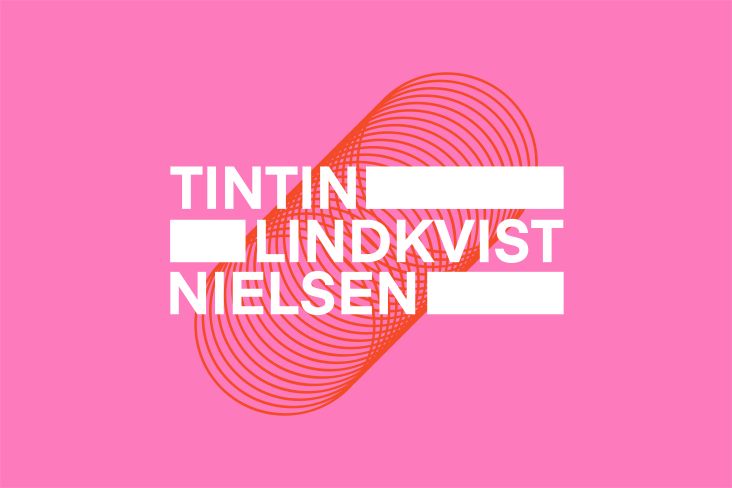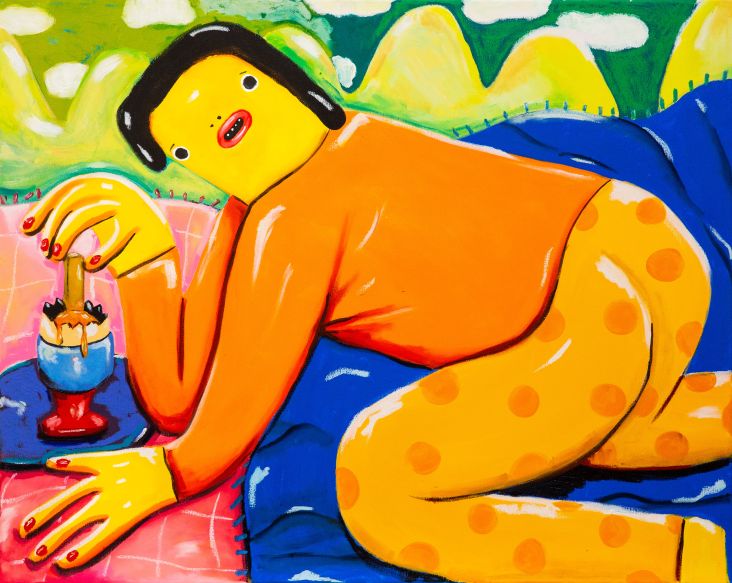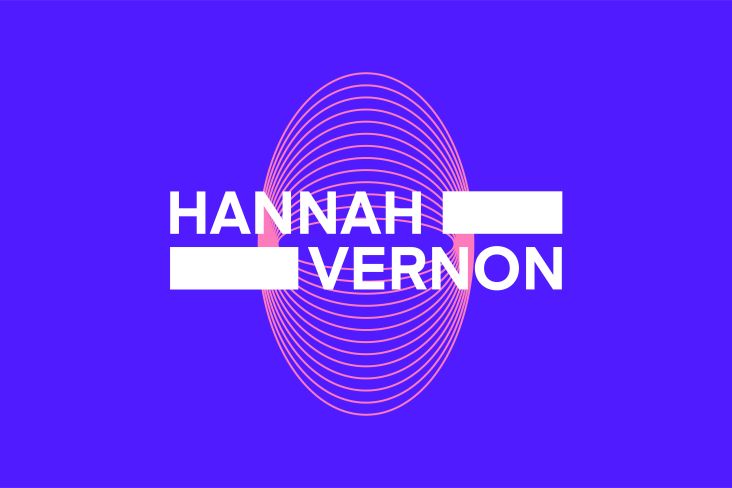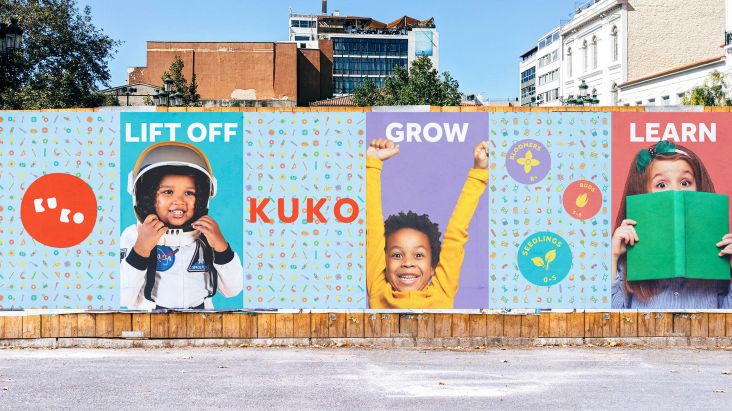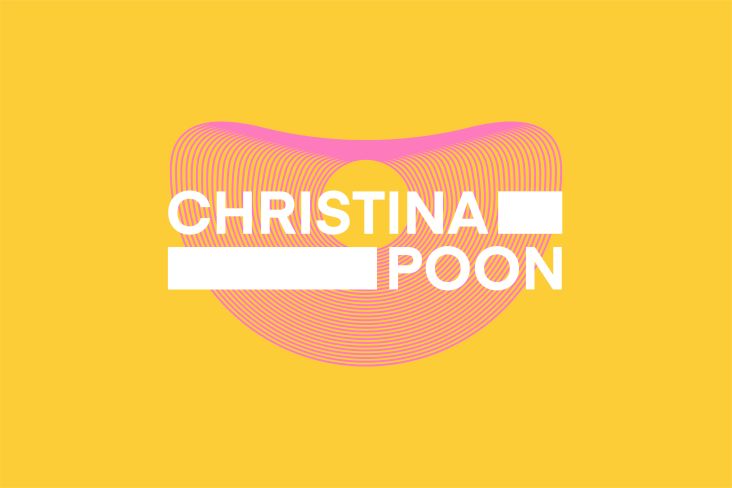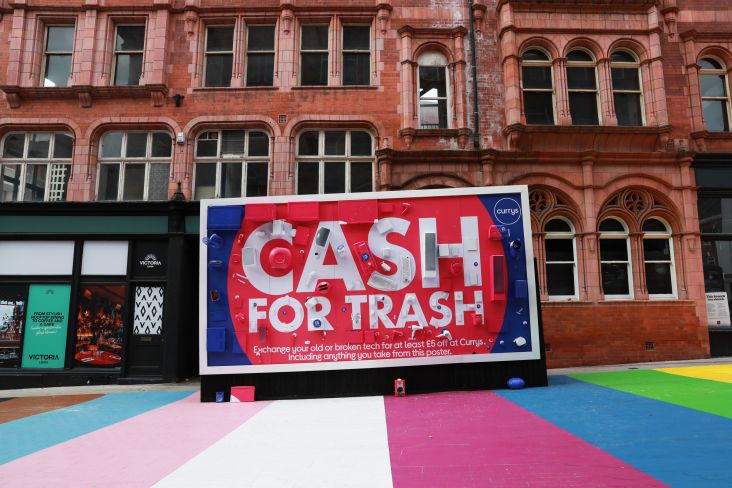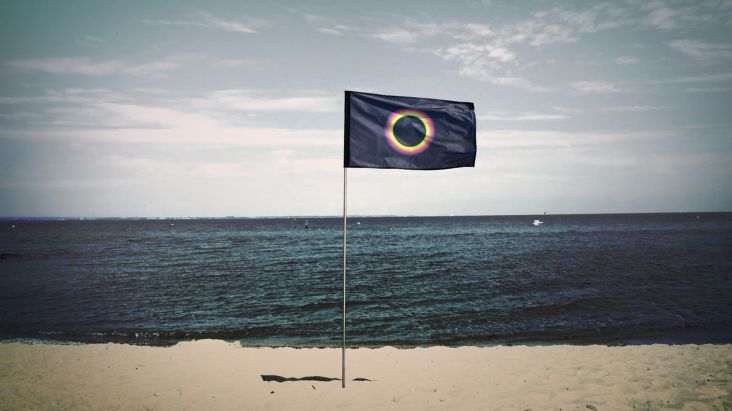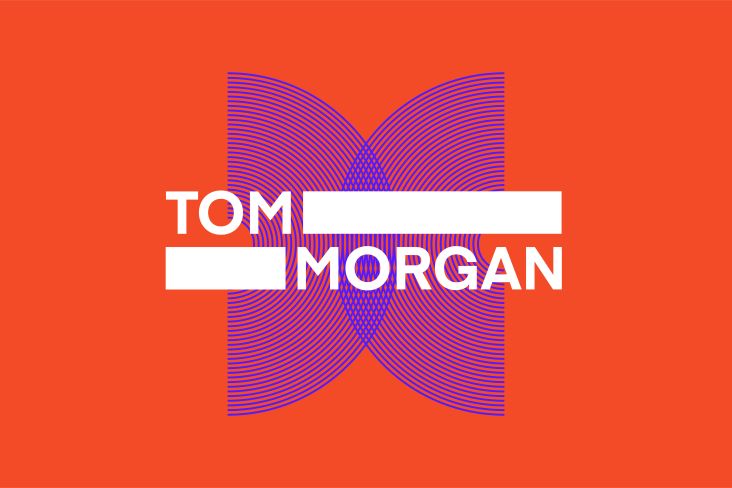Introducing: Shaqúelle Whyte on soft worldbuilding and capturing small moments
As part of our series focusing on new creative graduates, we celebrate Shaqúelle Whyte from the Slade School of Fine Art. Here he chats to us about soft world-building, doubling down on your practice, and taking inspiration from small moments.
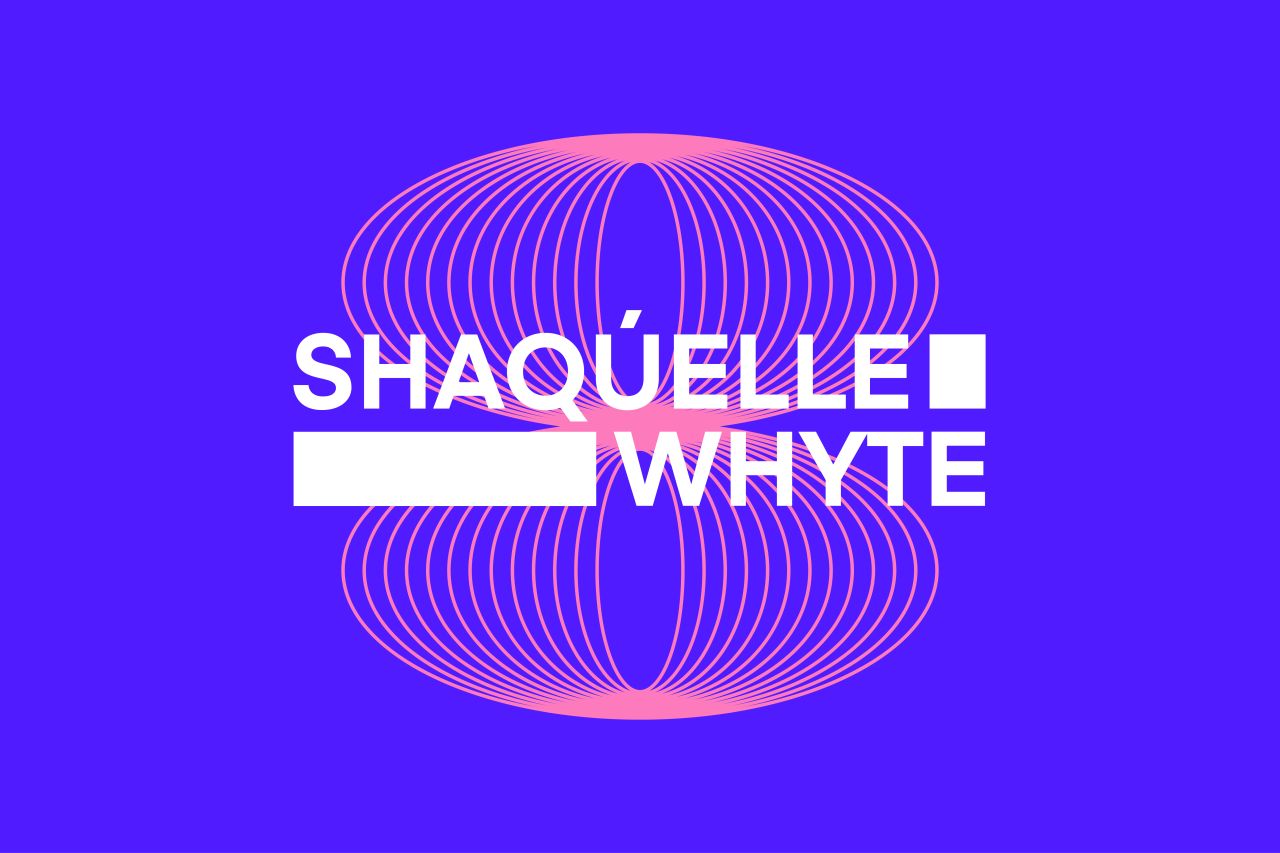
Born in Wolverhampton and now living in London, Shaqúelle Whyte is a figurative painter known for exploring the human condition through ambiguous narratives. Through painting, he directs imagined characters as if they were actors, and the canvas is the stage.
"As characters, they each represent a sect of my personality," he explains. "A space for me to inquire into different possibilities without consequence. It has become a key component of my practice. Their likeness is a tool rather than the driving force of emotion as it is not their story I am telling but mine."
Shaqúelle has just completed a BA at UCL's Slade School of Fine Art and is about to embark on a master's at the Royal College of Art. But he's already selling to private collectors and seeing his work on display, which he puts down to a combination of good fortune, hard work and determination. We chatted to Shaqúelle about his pandemic journey, his personal style and his hopes for the future.
Where did you grow up?
I grew up in Blakenhall, Wolverhampton, with my mum and my grandma. It's the Midlands. I get called 'Northerner' when I'm down here in London, but I'm a Yam Yam Brummie.
Going into secondary school, I was pretty competitive. And while I was good at art, other people were better. But I became increasingly interested in art because my mum would take me to Birmingham Gallery and Wolverhampton Gallery; she tried to expose me to as much art and culture as possible.
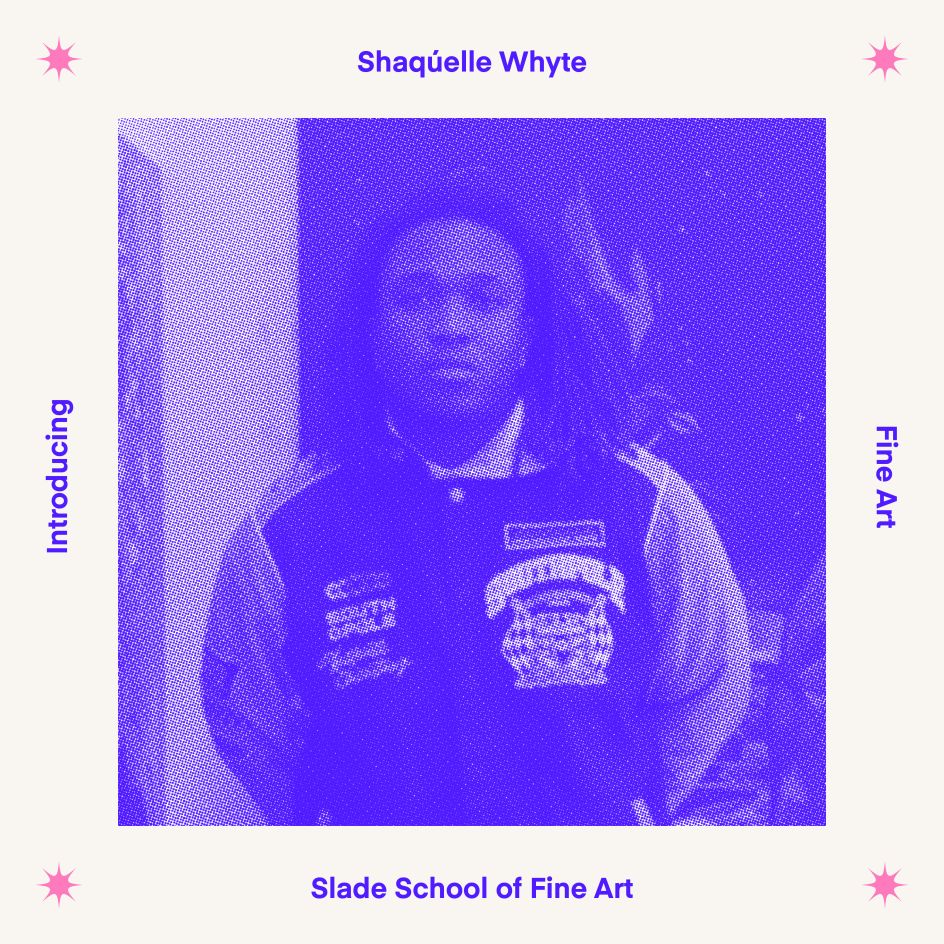
Why did you apply to art school?
Going into A levels, I was thinking of doing a law degree. But I did some work experience in law, which was boring. I just thought: 'I can't imagine doing this'. And I realised that art was what I truly loved. So it was a case of 'double down, double down'.
I found out about Slade because one of my close friends, Ciara Martin, was in the year above me, and she did the UCL summer school. After I'd just turned 17, I followed her example and just had a fantastic time. I also did a summer course at Art Academy in London's Borough Market. And I fell in love with London. So I decided to apply to Slade, even though my teacher told me how hard it was to get into.
What did you like most about art school?
Art schools in the UK teach you critical thinking. So you're forced to analyse your work and take it as far as possible. You keep conceptualising it. Keep on moving forward with it. And so, you find the technique and practice through repetition within your medium. Also, one thing that's different about Slade is the unusually high number of painters on its fine art course.
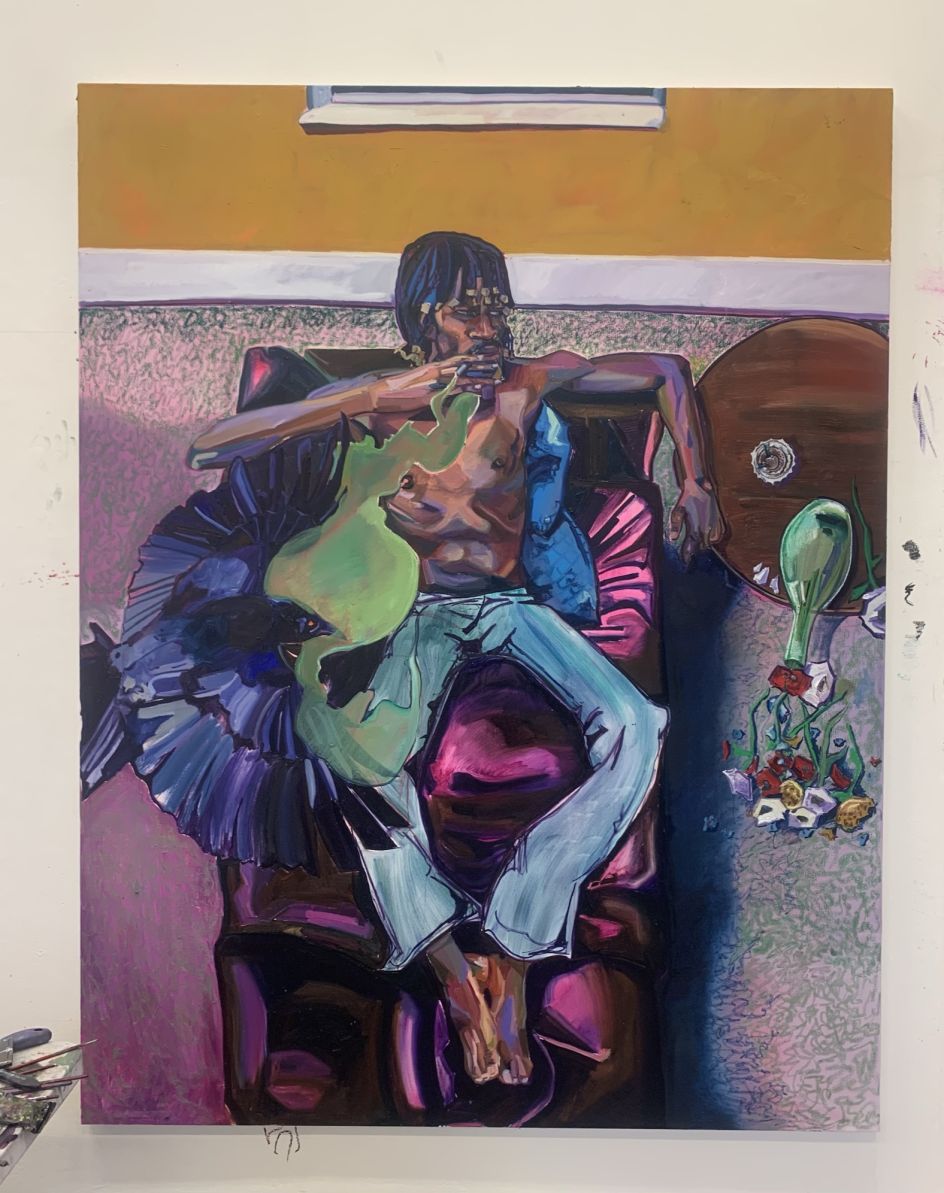
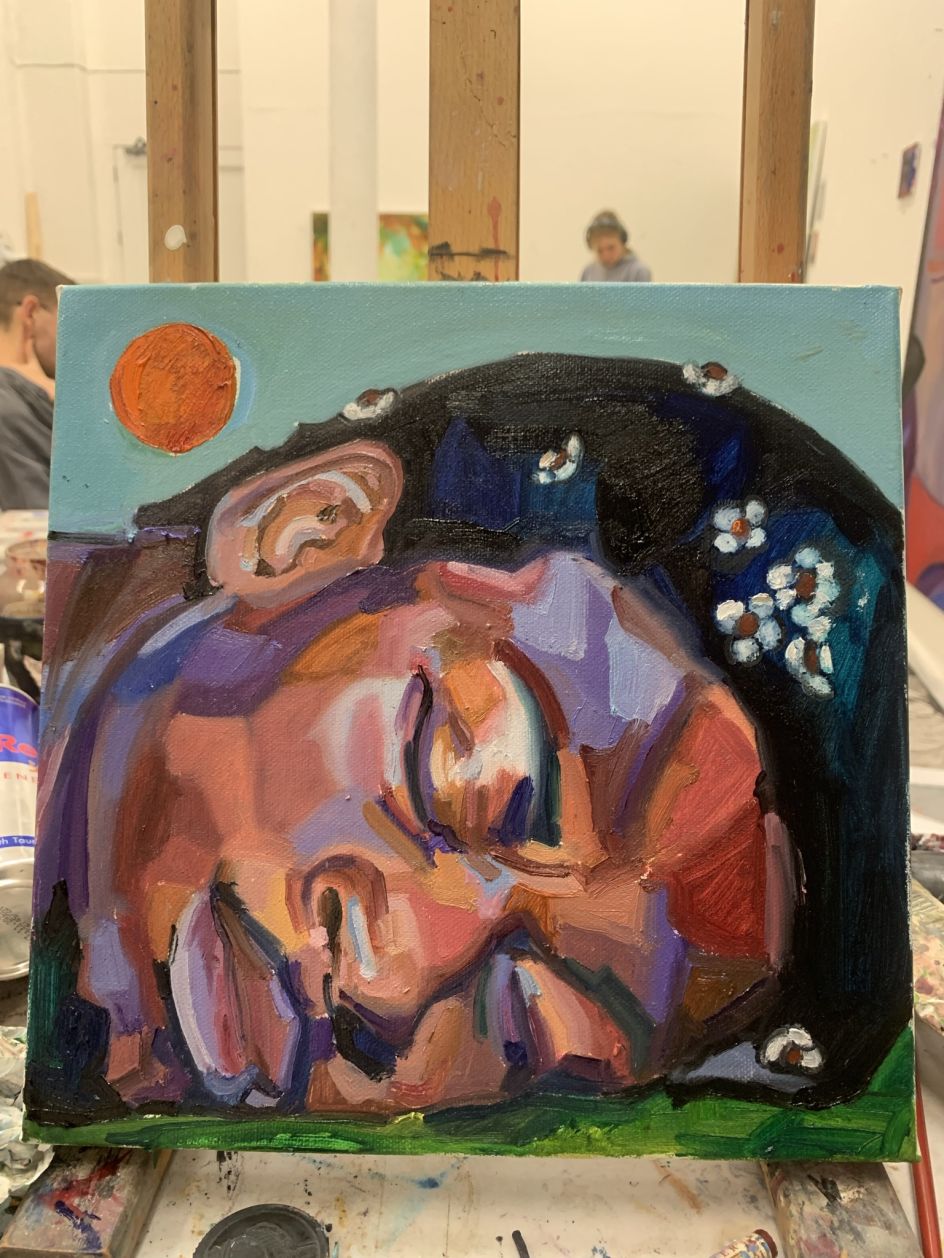
How did the pandemic affect your studies?
The pandemic was one of the best things and one of the worst things that could have happened. When it hit, all of a sudden, I didn't know what was going on. I ended up back at home in Wolverhampton. We were initially told it was going to be two weeks. I mean, what're two weeks? But then two weeks ended up being a month, which ended up being three months. I was home from March till June. So I started painting. I kept on painting. At least I knew what to do with the time.
The whole pandemic was when you had to double down. Working, working, working. And because of that, I got a residency at the Columbia Hotel, in west London, in collaboration with Roman Road. I met some incredible people, and from that, I got to sell to some collectors in London. And then it progressed through into selling more into Europe and Asia and speaking to galleries.
All this happened because I was able to double down on my practice. And there wasn't enough room for me to lament my anxieties. So I ended up creating a lexicon of language that I could use that belonged to me.
I had this little world: this thing that's been built like a gyroscope moving on an infinite axis. That axis is still very small, but I'm still trying to expand it. If you use the analogy that this is a globe and I'm trying to build a world, at the moment, I've probably got half of Liverpool, but I'm thrilled to have that at this stage.
Not everybody was fortunate to have had that kind of experience during the pandemic. But for me, I was blessed.
Tell us about your final work at the graduate show this summer. There seems to be a theme of masks?
Yeah, I use masks all the time in my work. The way I describe it is to separate into splits of myself, that all have autonomy. I can make that relatively hyperbolic and ask questions about the work through this lyrical space-time I've gone through. They don't necessarily go sequentially. But you see that this character is in this painting, this character in that painting, and they return. And the masks evolved from trying to encapsulate a secondary character within the work. So essentially, the world builds up.
It's like writing a book or a soap opera. But in ways where things don't have to make sense. The joy of the canvas is that it's infinite. It is a space that belongs to me, where I can do whatever I want.
This functions on two fronts: in terms of the idea I'm talking about now and the materiality of how you fall into the work. One of my favourite painters is Rothko. His colour-field paintings are amazing because the infinite promises they bring, when you're falling into this void of simplicity, are so not simple. So I adapt that to figurative painting.
The way I describe it is soft world-building. When I think about world-building, I think of Studio Ghibli movies or Harry Potter. So to take Harry Potter, we've now got the law, because there's been so many books and stuff like that. But realistically, to understand the story, you don't need to understand all of the intricacies of magic. It's the same with Studio Ghibli. You don't need to explain the rules to believe in the thing in front of you. And I think painting's the same thing: there's a looseness.
One of my big fears is putting all my eggs in one basket. I'll always paint regardless. But a certain pressure is put on because this is your thing.
Can you tell us about your painting 'See you soon, I'm sure'?
I was thinking about the painting 'Samson and Delilah' by Rubens and recontextualising that within a scenario, I felt that I'd been through. The new experiences of dating, being in London and figuring out my own boundaries. And then contextualising these new experiences within the art that I love.
I like to draw on little moments. Like, right now, I've got this painting that I'm working on of a guy smoking in a doorway. But then other pieces are a bit more bombastic.
With that in mind, how do you describe your style?
I'm a figurative painter. I think I'll always be a figurative painter. I enjoy using a figure within space and like describing the interaction. But in terms of what kind of painting style I use…? I think I draw on too much, in so many different ways, to describe it specifically.
For example, I love Cornelia Parker. She's a sculptor that uses found objects. But it's the thinking behind it that inspires me. And at the moment, I'm at the very beginning of a career. And I want my painting to grow and evolve and de-evolve over time. So for me to turn to you and say that my painting is 'this' will set too much precedent over what it could be in future.
The main thing I can say is that my works include figures, they're described through space and environments, and they both have relationships with each other. But the figure isn't the sole purpose of the painting. It's about the environment in which they're released and the aesthetics and the way they fall through each other.
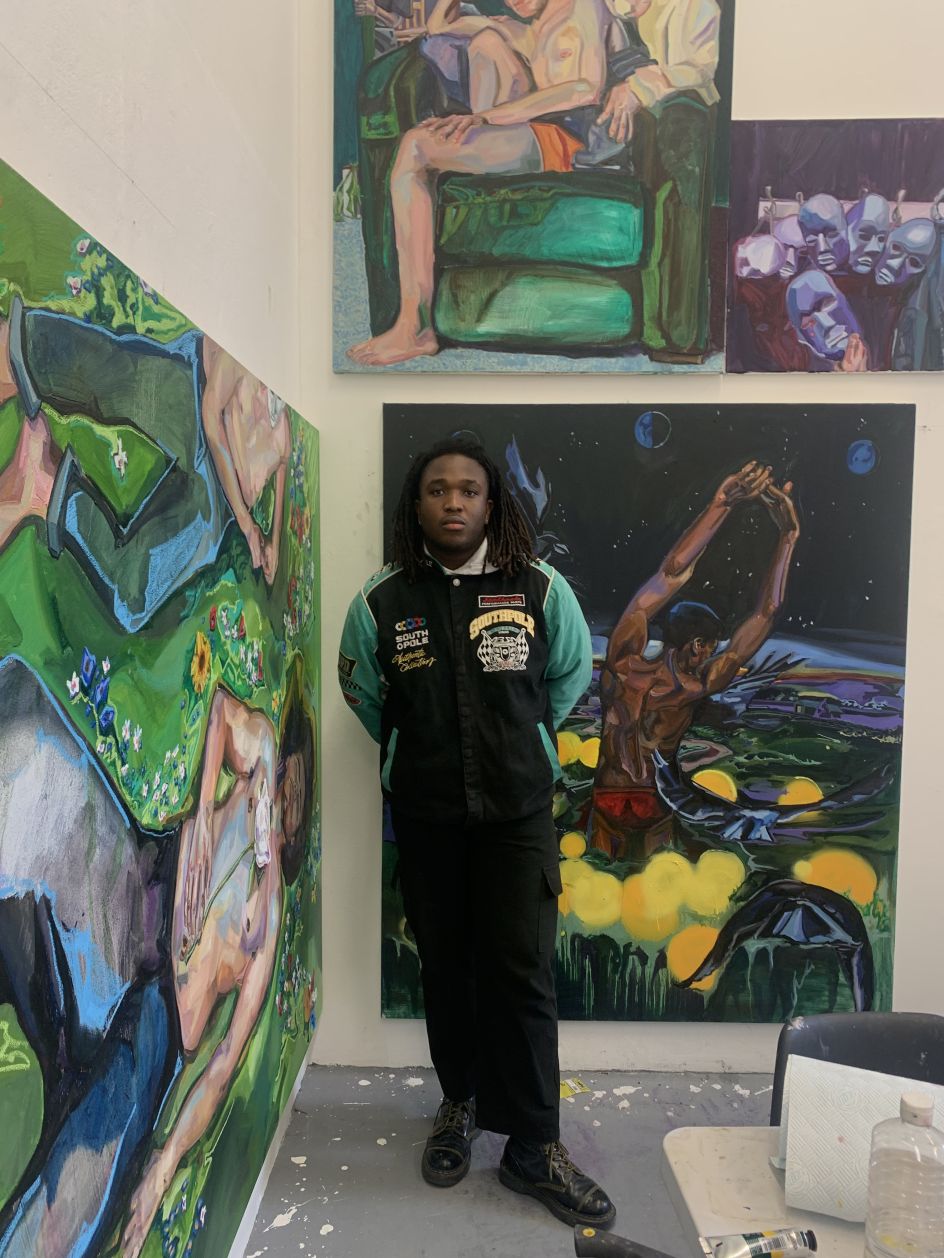
Who or what inspires your work?
Oh my God: I love so many artists. Michael Armitage is outstanding. And Daniel Richter, Monet, Manet, Titian, Rubin, Kudzanai-Violet Hwami, Salman Toor, Amanda Barr, Kyōsai, Hokusai. There are so many.
I also take inspiration from my day-to-day life. I'll have a little moment with somebody when I'm having a conversation or seeing something. I'm also trying to read more. And sometimes, it can be as simple as that. For example, I'm watching How I Met Your Mother for the second or third time. There are little interactions that happen in there and overarching narratives, and I think: how would I react within that situation? What's going on here? It's fun to place yourself in different scenarios. Those are some of the places where I find inspiration.
What do you hope to do with your career?
I see myself having a huge studio, making works that ever evolve, and pushing myself – because the art world and the artwork need to remain separate. Within the art world, there's a certain expectation of what you should do and how you should be. But for me, the work needs to be the work. It just needs to evolve in and of itself.
In the next couple of years, I want to have solo shows, to be in group shows. I want to get a bigger studio to facilitate my ideas. But I also want to have a bit of fun with it.
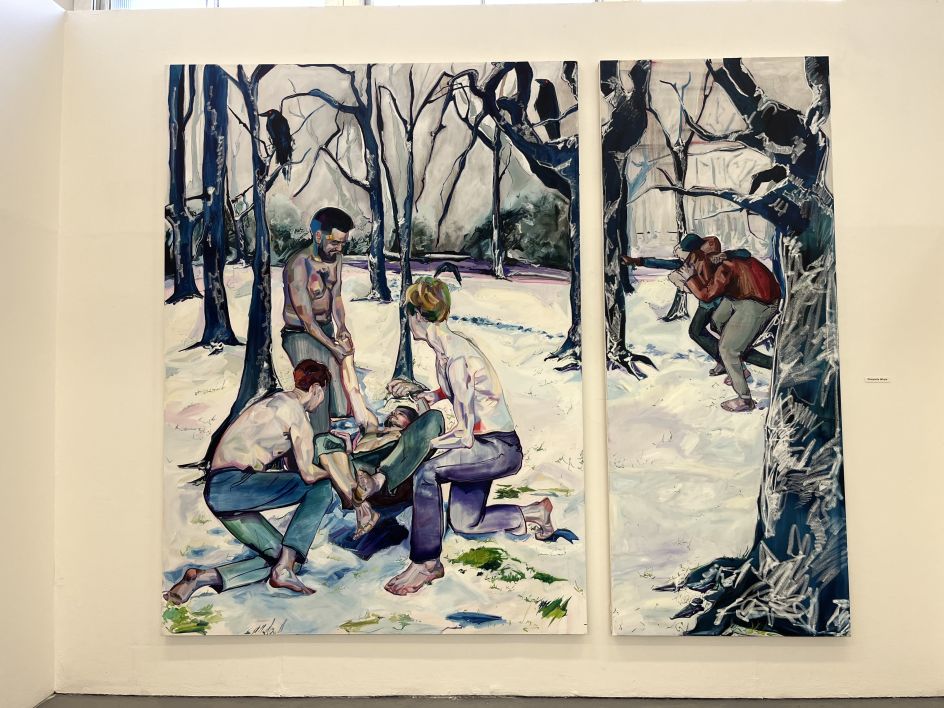
How do you feel about graduating in the summer of 2022?
2022 has been a lot because the degree show was so mad. We've been the first class that had a proper degree show since 2019. There's been such a massive, amazing cohort of creatives that have graduated this year. So I feel fortunate that people within the art world seem to know who I am. My main plan is to work as hard as possible and keep up with everybody else.
One of my big fears is putting all my eggs in one basket. I'll always paint regardless. But a certain pressure is put on because this is your thing. For example, there's no actual summer holiday for me this year. I'm in the studio. I'm currently in a residency at PM/AM. And I'm going to another one straight after.
What advice would you give to other aspiring artists?
Focus on your journey. People take different amounts of time. Some 21-year-olds know what they're doing, and some 28-year-olds don't have a clue. But it's about judging your own success by what you think you're capable of. You'll be alright if you're constantly working towards something. It will sort itself out. Don't worry too much, and keep pushing harder.

















